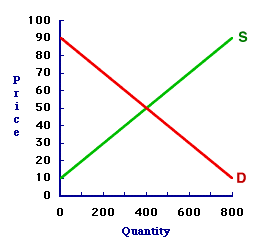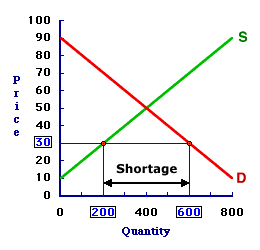
|
|
PEAK: The transition of a business cycle from an expansion and a contraction. The end of an expansions carries the descriptive term peak. At the peak, the economy has reached the highest level of production in recent times. The bad thing about a peak, however, is that it is a turning point, a turning point to a contraction. So even though a peak is the "highest" is not necessarily something we want. We would prefer never to reach the peak.
Visit the GLOSS*arama
|
|


|

|
                           SHORTAGE: A condition in the market in which the quantity demanded is greater than the quantity supplied at the existing price. Because buyers are unable to buy as much of the good as they want, a shortage generally causes an increase in the market price, which then acts to restore equilibrium. A shortage, which also goes by the terms excess demand and sellers' market, is one of two basic states of disequilibrium for the market. The other is surplus. A shortage exists in a market when the current market price is less than the equilibrium price. Acting on the law of demand and law of supply, the relatively low price generates a larger quantity demanded and a smaller quantity supplied than needed for equilibrium. In other words, when the price is relatively low, buyers want to buy a lot more of the good than sellers want to sell.A market shortage can be caused by a change in any of the demand determinants or supply determinants. An increase in demand or a decrease in supply does the job. A shortage also can be imposed on a market through government intervention, especially by establishing a price ceiling below the equilibrium price. Working the Market| The Shortage |  |
A shortage can be illustrated using the market for 8-track tapes displayed in this exhibit. This graph was generated after long hours attending the 88th Annual Trackmania 8-Track Tape Collectors Convention at the Shady Valley Exposition Center.The equilibrium, found at the intersection of the negatively-sloped demand curve and positively-sloped supply curve is at a price of 50 cents and a quantity of 400 tapes. Equilibrium, however, is not the primary point of interest. The interest lies in disequilibrium and shortage. A shortage emerges at any price below the equilibrium price of 50 cents. A prime candidate to generate a shortage is a price of 30 cents. Click the [Shortage] button to illustrate the resulting shortage. - Quantity Supplied: At 30 cents, the quantity supplied is only 200 tapes. Because the price is relatively low, sellers are guided by the law of supply and are not willing and able to offer much of the good for sale.
- Quantity Demanded: However, at the same 30 cent price, the quantity demanded is 600 tapes. At this relatively low price, buyers act according to the law of demand and are willing and able to buy a great deal of the good.
- The Shortage: The end result is that the quantity demanded exceeds the quantity supplied by 400 tapes. As such, the shortage at 30 cents is 400 tapes. Of course, a different price generates a different shortage.
Then What?| Eliminating the Shortage |  |
A market reacts in a specific manner in response to a shortage. Although sellers are able to sell as much of the good as they want at the going market price, buyers are not able to buy as much of the good as they want. In this example, sellers are able to sell all 200 tapes they offer for sale. Buyers, however, are only able to buy 200 of the 600 tapes they want. The buyers come up short by 400 tapes.Because buyers are not satisfied with this shortage, because they cannot buy all of the tapes that they are willing and able to buy at 30 cents each, they are motivated to offer a higher price, to induce sellers to part with a larger quantity. Click the [Price Rise] button to illustrate what occurs. What happens as this price rises? - Increase in Quantity Supplied: According to the law of supply, a higher price induces an increase in the quantity supplied. This is just the sort of thing that the buyers hope happens when they offer a higher price. They want a larger quantity supplied.
- Decrease in Quantity Demanded: However, according to the law of demand, a higher price also induces a decrease in the quantity demanded. Buyers who demand a large quantity at the 30 cent price are inclined to reduce their quantity demanded as the price rises.
- No More Shortage: The increase in the quantity supplied and the decrease in the quantity demanded both act to eliminate the shortage. Best of all, as long as any shortage exists, the price continues to rise, and the shortage shrinks. The price stops rising ONLY when it reaches 50 cents, which is the equilibrium price, the price that generates the same quantity demanded as supplied. It is the price that does not have a shortage.

Recommended Citation:SHORTAGE, AmosWEB Encyclonomic WEB*pedia, http://www.AmosWEB.com, AmosWEB LLC, 2000-2025. [Accessed: July 18, 2025].
Check Out These Related Terms... | | | | | | | | | | |
Or For A Little Background... | | | | | | | |
And For Further Study... | | | | | | |
Search Again?
Back to the WEB*pedia
|



|

|
YELLOW CHIPPEROON
[What's This?]
Today, you are likely to spend a great deal of time searching the newspaper want ads trying to buy either a T-shirt commemorating the 2000 Olympics or a genuine fake plastic Tiffany lamp. Be on the lookout for telephone calls from former employers.
Your Complete Scope
This isn't me! What am I?
|

|
|
Woodrow Wilson's portrait adorned the $100,000 bill that was removed from circulation in 1929. Woodrow Wilson was removed from circulation in 1924.
|

|
|
"A winner is someone who recognizes his God-given talents, works his tail off to develop them into skills, and uses those skills to accomplish his goals. " -- Larry Bird, basketball player
|

|
NEDC
National Economic Development Council
|

|
|
Tell us what you think about AmosWEB. Like what you see? Have suggestions for improvements? Let us know. Click the User Feedback link.
User Feedback
|


|


